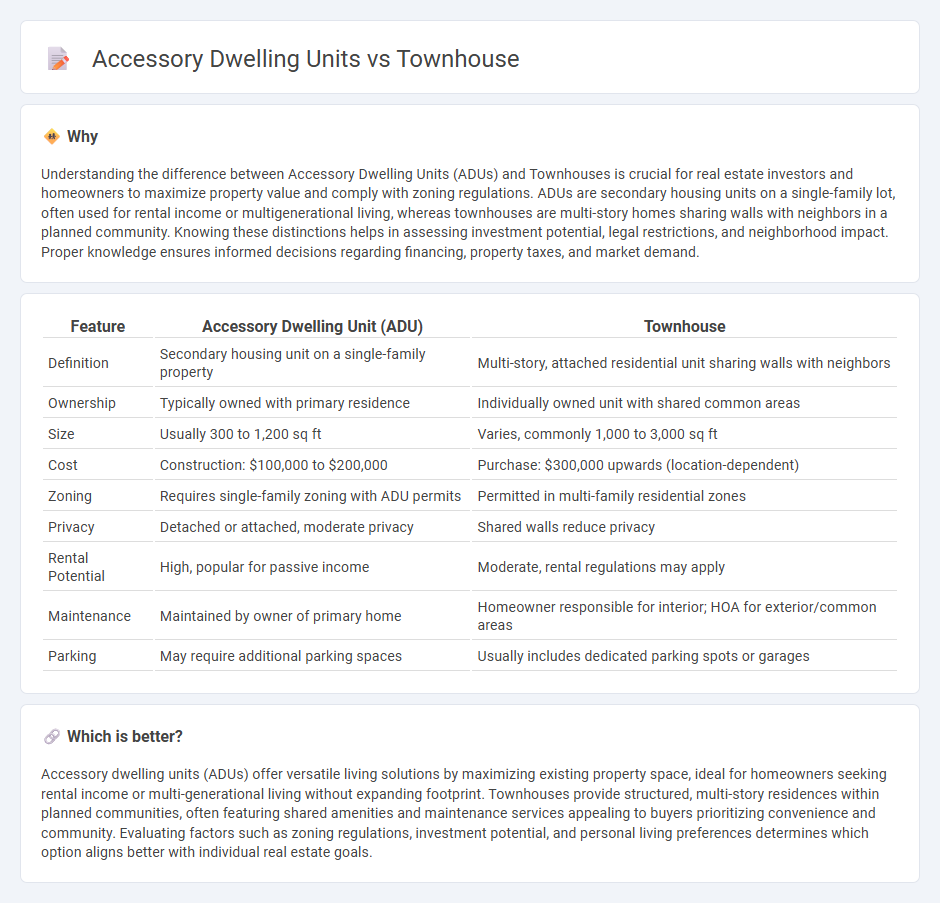
Accessory dwelling units (ADUs) are secondary housing units located on the same lot as a primary residence, offering flexible living spaces for rental income or multi-generational families. Townhouses are multi-level homes sharing walls with adjacent properties, often found in planned communities with shared amenities and maintenance services. Discover the benefits and differences between ADUs and townhouses to determine the best real estate investment for your needs.
Why it is important
Understanding the difference between Accessory Dwelling Units (ADUs) and Townhouses is crucial for real estate investors and homeowners to maximize property value and comply with zoning regulations. ADUs are secondary housing units on a single-family lot, often used for rental income or multigenerational living, whereas townhouses are multi-story homes sharing walls with neighbors in a planned community. Knowing these distinctions helps in assessing investment potential, legal restrictions, and neighborhood impact. Proper knowledge ensures informed decisions regarding financing, property taxes, and market demand.
Comparison Table
| Feature | Accessory Dwelling Unit (ADU) | Townhouse |
|---|---|---|
| Definition | Secondary housing unit on a single-family property | Multi-story, attached residential unit sharing walls with neighbors |
| Ownership | Typically owned with primary residence | Individually owned unit with shared common areas |
| Size | Usually 300 to 1,200 sq ft | Varies, commonly 1,000 to 3,000 sq ft |
| Cost | Construction: $100,000 to $200,000 | Purchase: $300,000 upwards (location-dependent) |
| Zoning | Requires single-family zoning with ADU permits | Permitted in multi-family residential zones |
| Privacy | Detached or attached, moderate privacy | Shared walls reduce privacy |
| Rental Potential | High, popular for passive income | Moderate, rental regulations may apply |
| Maintenance | Maintained by owner of primary home | Homeowner responsible for interior; HOA for exterior/common areas |
| Parking | May require additional parking spaces | Usually includes dedicated parking spots or garages |
Which is better?
Accessory dwelling units (ADUs) offer versatile living solutions by maximizing existing property space, ideal for homeowners seeking rental income or multi-generational living without expanding footprint. Townhouses provide structured, multi-story residences within planned communities, often featuring shared amenities and maintenance services appealing to buyers prioritizing convenience and community. Evaluating factors such as zoning regulations, investment potential, and personal living preferences determines which option aligns better with individual real estate goals.
Connection
Accessory dwelling units (ADUs) and townhouses enhance urban housing density by maximizing land use within existing residential zones. ADUs provide flexible living spaces on single-family lots, while townhouses offer multi-unit structures with shared walls, together addressing affordability and housing shortages. Both contribute to diverse neighborhood development and support sustainable urban growth strategies.
Key Terms
Ownership Structure
Townhouses typically offer individual ownership of both the unit and the land, providing full property rights and more control for the owner. Accessory Dwelling Units (ADUs) are usually part of a primary residential property, with ownership tied to the main house, limiting separate property rights but allowing flexible use for rental or family housing. Explore more about the differences in ownership structures and legal implications of townhouses versus ADUs.
Zoning Regulations
Zoning regulations for townhouses often require minimum lot sizes, setbacks, and density limits set by municipal codes, which vary widely across jurisdictions. Accessory dwelling units (ADUs) typically face relaxed zoning rules, encouraging secondary living spaces without extensive lot expansions or density changes. Explore local zoning ordinances to understand specific requirements and opportunities for both townhouses and ADUs.
Shared Walls vs. Detached Units
Townhouses feature shared walls that optimize land use and reduce construction costs, while accessory dwelling units (ADUs) are freestanding structures offering greater privacy and flexibility on a single property. Shared walls in townhouses promote community living and energy efficiency, whereas detached ADUs provide separate entrances and independent utility systems. Explore the benefits and considerations of each housing type to determine the best fit for your development goals.
Source and External Links
Townhouse Detroit - Located in the heart of Detroit, this venue offers a magnificent atrium, bar, and outdoor terrace, ideal for special occasions.
Townhouse - Wikipedia - A townhouse is a type of terraced housing, often featuring multiple floors with shared walls, historically used as city residences for nobles and wealthy families.
What is a townhouse? | Rocket Mortgage - Townhouses are multi-floor homes with shared walls, often found in urban and suburban areas, offering an affordable housing option with potential for shared amenities.
 dowidth.com
dowidth.com